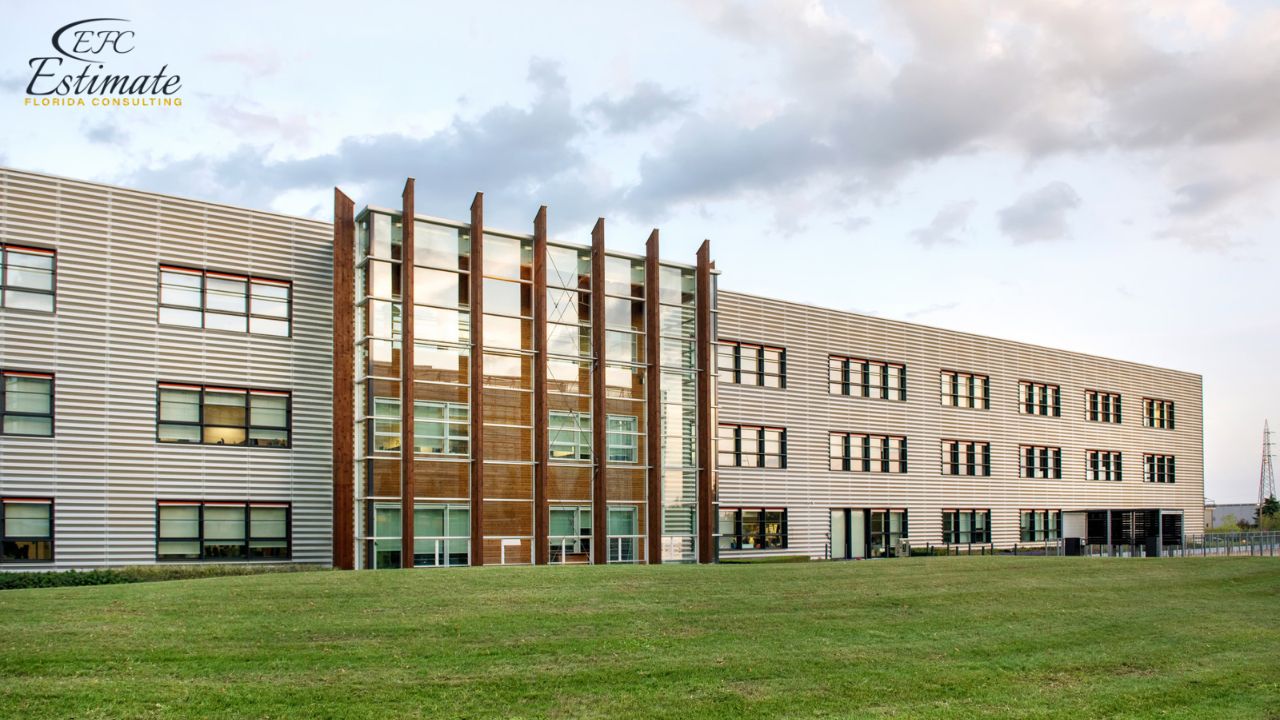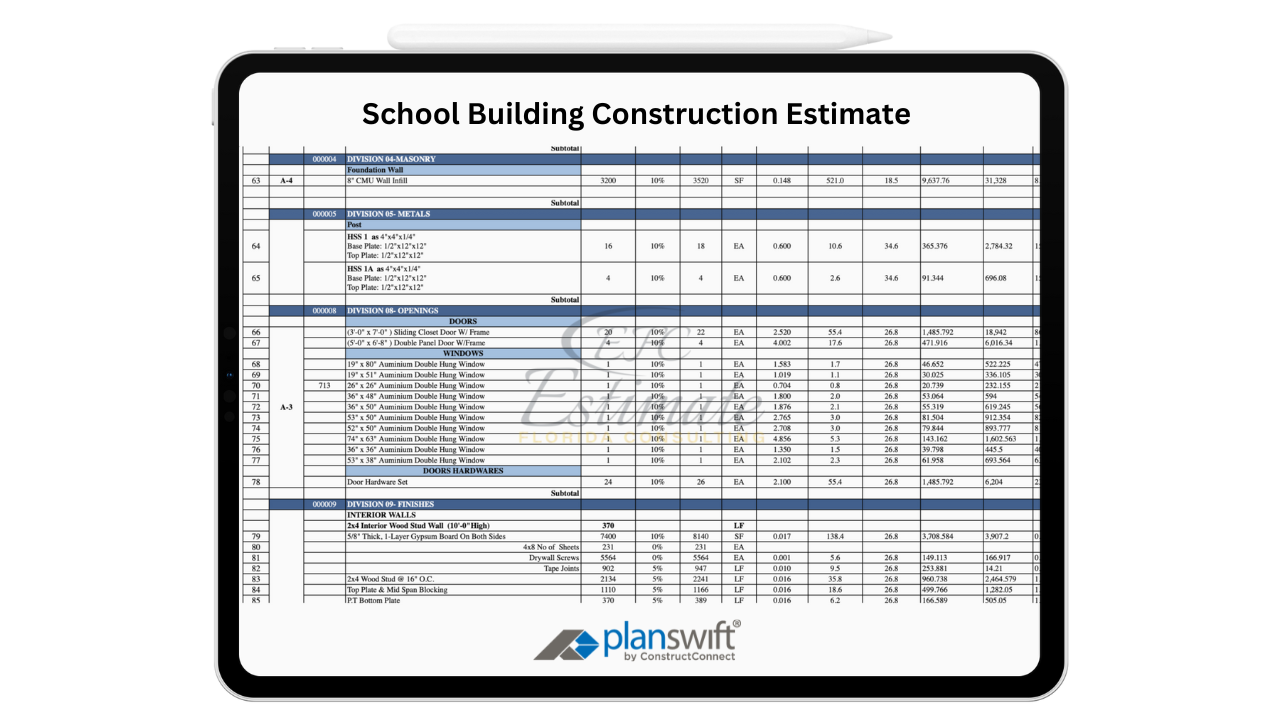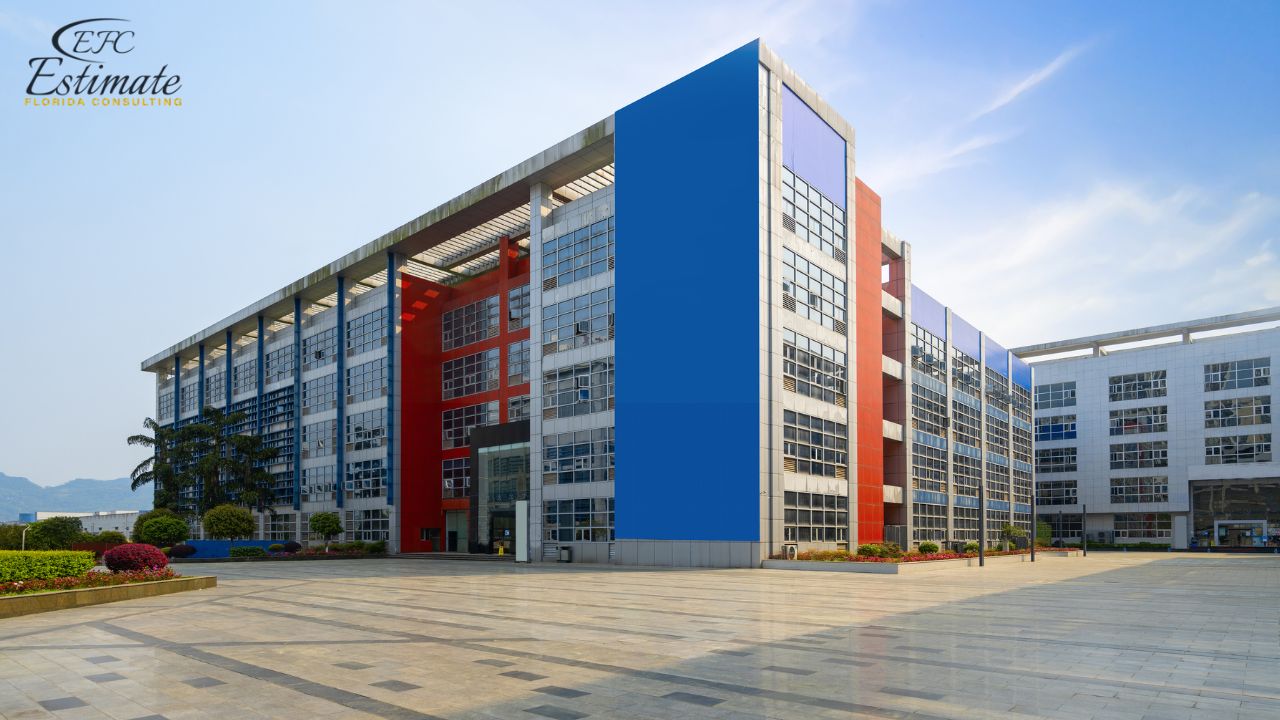- Homepage
- Construction in Jacksonville
School Construction in Jacksonville
Leading provider of school construction services.
Building a school in Jacksonville is a transformative project that blends educational needs with the city’s unique environmental and economic challenges. From compact elementary schools to expansive high school campuses, construction costs reflect Jacksonville’s premium real estate, stringent building codes, and growing demand for modern facilities. At Estimate Florida Consulting, we specialize in delivering precise, tailored estimates to help you plan your school project effectively. In this guide, we’ll explore school construction costs in Jacksonville, complete with detailed tables, an in-depth breakdown with added construction specifics, and answers to common questions—ensuring you’re ready to invest in education infrastructure that lasts.

What Drives School Construction Costs in Jacksonville?
Jacksonville’s construction landscape is shaped by several high-cost factors. Land in urban areas like Downtown Miami or Coral Gables ranges from $75 – $200 per square foot, driven by scarcity and competition, while suburban zones like Westchester or Cutler Bay offer relief at $30 – $75 per sq ft. The tropical climate demands hurricane-resistant designs—think reinforced concrete and impact windows—elevating material and labor expenses. Skilled labor shortages push wages to $35 – $50/hour for trades like carpenters or HVAC technicians, and premium materials (e.g., corrosion-resistant steel) are non-negotiable near the coast. School-specific needs—classrooms, safety features, and energy-efficient systems—further increase costs, as do Miami-Dade County’s strict permitting and educational compliance standards. Expect costs to range from $250 to $500 per square foot, and let’s break it down.
School Cost Construction in Jacksonville
Here’s a detailed table with elevated cost estimates for Jacksonville’s premium market:
| School Type | Size (Square Feet) | Cost Range (Total) | Cost Per Sq Ft | Construction Timeline |
| Small Elementary School | 20,000 – 40,000 | $6M – $12M | $250 – $300 | 12-18 months |
| Small Middle School | 30,000 – 50,000 | $9M – $15M | $300 – $350 | 14-20 months |
| Large High School | 80,000 – 120,000 | $25M – $45M | $350 – $400 | 24-36 months |
| Large Multi-Level Campus | 120,000 – 200,000 | $40M – $75M | $400 – $500 | 30-48+ months |
Note: Costs include construction, infrastructure, and basic equipment but exclude land acquisition. For a custom estimate, call 561-530-2845.
90% More Chances to Win Projects With Our Estimate!
- Multi-Family Building
- Hotel Building
- Hospital Building
- Warehouse Building
- School & University Building
- High-Rise Building
- Shopping Complex
- Data Center Building

School Construction Detailed Breakdown
Schools in Jacksonville range from small elementary or middle schools serving local communities to large high schools or multi-level campuses designed for broader populations. Below is a comprehensive breakdown of construction phases, costs, and school-specific details, covering the spectrum of sizes (20,000 to 200,000 square feet) and scopes in Miami’s high-cost environment.
Size & Scope
- Square Footage: Small schools span 20,000 to 50,000 square feet, while large schools range from 80,000 to 200,000 square feet, depending on grade level, student capacity, and features.
- Total Cost Range: Small schools cost $6M – $15M, while large schools range from $25M – $75M, reflecting Jacksonville’s premium rates, scale, and educational requirements.
- Examples: A 30,000 sq ft elementary school with 15 classrooms and a playground, a 40,000 sq ft middle school with a small gym, a 100,000 sq ft high school with 40 classrooms and an auditorium, or a 150,000 sq ft multi-level campus with labs and sports fields.

Construction Phases & Costs
Site Preparation ($300K - $2.5M):
For smaller schools (20,000-50,000 sq ft), site prep involves clearing overgrown lots, grading terrain, and stabilizing Jacksonville’s sandy or wetland soils with excavators, costing $300K – $600K. Larger campuses (80,000-200,000 sq ft) require extensive grading, excavation, and soil stabilization (e.g., lime or geotextiles) across limestone, sand, or peat, escalating to $1M – $2.5M. Drainage systems—retention basins, underground pipes, or stormwater vaults—are critical given Jacksonville’s 60+ inches of annual rain and flood risk, needing imported fill at $25 – $45 per cubic yard. Coastal sites may require wetland or mangrove permits, adding $150K – $400K for larger projects. School-specific prep includes safe drop-off zones, bus loops, and service entrances, designed to manage Key West’s congested traffic and student volume, with larger schools needing separate lanes for parents and buses.
Structure ($1.2M - $18M):
Small schools rely on steel-framed buildings with insulated, hurricane-rated roofing (e.g., metal panels with R-21 insulation) for $1.2M – $2.5M, while large schools use wide-span steel frames with trusses (up to 250 feet) and HVAC integration ($2.5M – $4M extra), totaling $6M – $18M. Exterior walls use concrete masonry units (CMUs) or precast panels, coated with anti-corrosive sealants for Jacksonville’s salty air, and interiors feature soundproofing (e.g., double drywall with insulation) to minimize noise between classrooms. School-specific elements include wide hallways (8-12 feet) for student flow, oversized staircases or elevator shafts for large campuses, and reinforced bracing for open spaces like gyms or auditoriums, all built to withstand 175 mph winds per Miami-Dade codes.
Interior Finishes ($600K - $6M):
Small schools need durable flooring (vinyl or ceramic tile at $8 – $15 per sq ft) and acoustic ceiling tiles for classrooms, costing $600K – $1.2M, while large schools add labs with chemical-resistant countertops (e.g., epoxy resin at $50 – $80 per sq ft), theater-grade acoustics, and gym hardwood ($20 – $30 per sq ft), hitting $3M – $6M. Smartboards, built-in cabinetry, and ADA-compliant fixtures (e.g., low sinks, wide doors) are standard, with Jacksonville’s humidity requiring mold-resistant drywall and UV-protective window treatments. Safety features like ballistic glass, lockdown doors, and non-slip surfaces meet Florida’s post-2018 standards, with large schools adding tech hubs (e.g., Wi-Fi, projectors) for $500K – $1M.
Amenities ($400K - $10M):
Small schools include a cafeteria, playground with rubberized surfacing ($12 – $20 per sq ft), and 100-space parking for $400K – $800K, while large schools add a full gym (1,000-2,000 seats), auditorium with stage rigging, labs with fume hoods, and fields with synthetic turf ($15 – $20 per sq ft), costing $5M – $10M. Jacksonville-specific features include shaded courtyards, security fencing with keycard entry, and parking for 300-500 cars. Large campuses may include rainwater harvesting or outdoor classrooms, aligning with sustainability and safety priorities.
Soft Costs ($400K - $5M):
Small schools require architectural plans with DOE specs ($100K – $200K) and permits ($150K – $300K) for $400K – $900K, while large schools need detailed engineering ($300K – $600K) and permits ($800K – $1.5M) for $3M – $5M. Compliance with post-Parkland safety codes (e.g., secure vestibules, panic buttons), traffic studies, and environmental assessments (e.g., flood zones) add $30K – $500K, reflecting Jacksonville’s regulatory complexity.
Jacksonville-Specific Details
- Hurricane Prep: Impact-resistant windows, reinforced doors, and roof tie-downs add $150K – $300K for small schools and $2.5M – $4M for large, with classrooms or gyms doubling as storm shelters per 185 mph gust standards (2025 codes).
- Cooling Systems: HVAC costs $300K – $500K for small schools and $2M – $4M for large, combating Jacksonville’s 70-90% humidity and ensuring student comfort.
- Safety Mandates: Post-Parkland features—secure entryways, ballistic glass, and safe rooms—add $150K – $700K, scaled by size.
- Timeline: Small schools take 12-20 months, large schools 24-48+ months, with delays from rain (June-November) or permitting in busy areas like Doral.
Example Projects
- Small: A 30,000 sq ft elementary school with 15 classrooms (800-900 sq ft each), a cafeteria, playground, and 120 parking spaces costs $8M – $10M (14-18 months).
- Large: A 100,000 sq ft high school with 40 classrooms (900-1,000 sq ft each), a gym, auditorium, and 400 parking spaces costs $30M – $38M (24-30 months).
3D Rendering Cost for a School Building
The cost of 3D rendering for a school building varies based on factors like project complexity, level of detail, rendering quality, and turnaround time. Basic exterior renderings may start at $500 to $1,500, while high-quality, photorealistic 3D renders with interiors can range from $2,000 to $10,000 or more. Custom animations or VR walkthroughs can further increase costs. Hiring experienced 3D artists or agencies ensures accuracy, realistic visuals, and efficient project execution.
For School and Other Projects
Turnaround time is 1-2 days.
Win More Projects With Us
Jacksonville-Specific Considerations for School Construction
Jacksonville’s unique environment presents several challenges that impact school construction planning and costs.
- Hurricane Preparedness – Schools must be built with reinforced structures, impact-resistant materials, and secure shelters to withstand hurricanes, increasing construction costs by 10-20%.
- Flood Zones – Many areas require elevated foundations, advanced drainage systems, and waterproofing to mitigate flood risks due to Jacksonville’s low elevation and proximity to water.
- Permitting Challenges – Jacksonville has strict zoning and permitting regulations, which can extend project timelines and increase costs, especially in coastal areas with additional environmental restrictions.
- Labor Availability – High demand for skilled construction workers in South Florida may lead to increased labor costs and potential delays.
Proper planning, compliance with safety regulations, and collaboration with local authorities are essential for building resilient and efficient schools in Miami Beach.
Sustainable School Construction Trends in Jacksonville
Sustainability is becoming a key priority in Jacksonville’s school construction sector.
- Energy Efficiency – LED lighting, solar panels, and energy-efficient HVAC systems help reduce long-term operational costs and enhance energy sustainability.
- Green Materials – Recycled steel, low-VOC paints, and insulated concrete improve sustainability, reduce environmental impact, and promote healthier indoor air quality for students and staff.
- Water Management – Rainwater harvesting systems, permeable landscaping, and water-efficient fixtures help manage Jacksonville’s heavy rainfall and reduce water waste.
These sustainable features may increase initial costs by 5-15% but provide long-term savings, improved learning environments, and potential tax incentives, all while contributing to Jacksonville’s commitment to environmental responsibility.
Construction Timeline Expectations for Schools
Understanding timelines is crucial for planning and budgeting school construction projects in Jacksonville:
- Small Schools (Up to 20,000 sq. ft.) – Typically 6-12 months, depending on the complexity of design and local site conditions.
- Mid-Size Schools (20,000-50,000 sq. ft.) – 12-18 months, factoring in permitting, site preparation, and specialized construction for coastal environments.
- Large Schools (>50,000 sq. ft.) – 18-24+ months, especially with custom features such as advanced labs, sports facilities, and storm-resistant infrastructure.
Jacksonville-Specific Factors: Strict zoning laws, hurricane preparedness measures, flood zone regulations, and coastal construction challenges can extend timelines by 2-4 months. Early coordination with contractors, architects, and local authorities helps mitigate delays and ensures compliance with environmental and safety standards.
90% More Chances to Win School Bids with Our Estimate
Additional Construction Details
Material Choices
- Concrete: Precast panels ($150 – $200 per cubic yard) or poured-in-place with additives for Jacksonville’s wet conditions.
- Steel: Galvanized steel ($1,500 – $2,000 per ton) resists coastal corrosion.
- Roofing: Insulated metal or TPO systems ($15 – $25 per sq ft) handle heat and storms.
Design Considerations
- Orientation: Classrooms are strategically oriented to face north, minimizing direct sunlight exposure to reduce glare on learning surfaces and lowering cooling costs by optimizing natural light and heat management throughout the day.
- Ventilation: The design incorporates high-efficiency air filtration and circulation systems, paired with shaded courtyards that enhance natural airflow, reducing energy consumption by an estimated 10-20% while maintaining a comfortable indoor environment.
- Safety: The structure includes reinforced safe rooms and ballistic-resistant windows that meet Florida’s school safety standards, ensuring protection for students and staff in emergencies.

Land Acquisition Costs
- Urban Jacksonville: $75 – $200 per sq ft (e.g., $7.5M – $20M for 100,000 sq ft).
- Suburban Areas: $30 – $75 per sq ft, better for larger campuses.
Contingency & Extras
- Buffer: 15-20% contingency ($900K – $15M) covers delays or material spikes (e.g., steel up 20% in 2025).
- Premium Features: Solar panels, STEM labs, or green roofs add $2M – $8M.
Role Of Professionals for School Building Construction
- Contractors: Oversee the entire school construction project, ensuring quality work, managing materials, labor, and timelines while adhering to safety regulations. Hire experienced contractors to keep your project on track.
- Subcontractors: Specialize in critical tasks such as electrical systems, plumbing, HVAC installation, and structural work to ensure durability and efficiency. Hire skilled subcontractors for high-quality execution.
- Architects: Design innovative, functional, and energy-efficient school layouts that meet safety codes and enhance learning environments. Hire professional architects to create the perfect school design.
- Engineers: Ensure the structural integrity, safety, and efficiency of the school building by planning and overseeing mechanical, electrical, and civil aspects. Hire expert engineers to guarantee a strong and sustainable structure.
- Construction Estimators: Provide accurate cost assessments for materials, labor, and project timelines to help optimize budget planning and prevent cost overruns. Hire professional estimators to ensure financial efficiency and project feasibility.
Why Partner with Estimate Florida Consulting?
At Estimate Florida Consulting, we bring expertise to Jacksonville’s school construction challenges. We offer:
- Accurate estimates tailored to your school’s needs and Jacksonville’s market.
- Navigation of hurricane codes, safety laws, and environmental rules.
- Consultations—call 561-530-2845 to start today.
Conclusion
School construction in Jacksonville ranges from $6M for a small elementary to $75M for a large campus, driven by premium materials, labor, and local demands. With detailed planning, you can create a safe, modern learning environment. Contact Estimate Florida Consulting for a custom estimate and let’s build Jacksonville’s educational future!
Question Answer
Frequently Asked Question
Needs assessment and feasibility study
Site acquisition and due diligence
Conceptual design and space planning
Budgeting and cost estimation
Permitting and compliance approvals
Construction (civil, structural, MEP, finishing)
Technology integration and safety systems
Final inspection, commissioning, and handover
Public K-12 schools
Private and charter schools
International and IB-accredited campuses
Vocational and technical training centers
STEM-focused institutions
Green and net-zero energy schools
Flexible learning spaces (open floorplans, modular walls)
Outdoor classrooms and learning gardens
Biophilic design to improve student well-being
Technology-forward classrooms with interactive smartboards
Security-focused design (controlled entry, lockdown systems)
Sustainable construction using recycled materials and solar power
Standards vary, but commonly:
Elementary School: 90–100 sq ft/student
Middle/High School: 125–150 sq ft/student
Additional space for gyms, libraries, labs, cafeterias, and admin offices
Site preparation and utility access
Number of students (capacity)
Specialty facilities (labs, theaters, sports complexes)
Sustainable and green building goals
Material selection and finish level
Phasing requirements (for campuses staying operational during construction)
Secure entrances with visitor control
Surveillance and alarm systems
Safe zones and panic rooms (optional)
Clear evacuation routes and fire-rated corridors
Natural light and sightlines to improve supervision
- Electrical
- Plumbing
- Masonry
- Roofing
- Painting
- More

